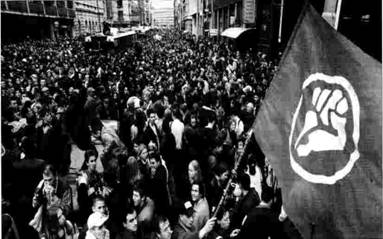Front-page horror stories of extremist preachers filling the heads of young British Muslims with suicidal thoughts are a crude but effective means of helping to create the environment necessary for authoritarian action. They also help to sell newspapers. So it is that, since the tragic events of July 7th, Fleet Street’s fundamentalists have focused on “mad” Omar Bakri Muhammad, “bad” Abu Qatada and, of course, the tabloid favourite: the one-eyed, hooked-handed Abu Hamza.
Caught in the spotlight are some of the very thinkers Muslims and non-Muslims need to hear. First there was Yusuf al-Qaradawi, widely regarded as a moderate and one of the most respected scholars in the Muslim world. But because Qaradawi has given qualified support to Palestinian suicide bombing, parts of the British media have linked him to the London bombs and demanded he be refused entry. His unreserved condemnation of the London bombers goes largely unreported.
And then there’s Tariq Ramadan. On Sunday, the Swiss-born Muslim academic is due to address young Muslims at a conference at London’s Islamic Cultural Centre, sponsored by the Metropolitan police. His message will be unambiguous: the authors of the London bombs were criminals, and we should not accept their justifications, whether ideological, religious or political.
The Sun is campaigning to have Ramadan barred from the UK as an “extremist Islamic scholar” who is “banned from America and France” and has “suspected links with terrorists”. It warns that the “soft-spoken professor” is “more dangerous” than Hamza and Bakri because his “moderate tones present a ‘reasonable’ face of terror to impressionable young Muslims”. These claims are being repeated as fact by other papers, TV pundits and politicians.
In reality, Ramadan is renowned across the Muslim world as a reformist thinker and is despised by traditionalists for his progressive interpretation of Islamic sources. Along with millions of non-Muslims in this country, he supports the right of Palestinians and Iraqis to resist occupation but has never supported suicide bombings. He has no links with any terrorist group and is not banned by France. When his visa to teach in the US was revoked last year days before he was due to take up a professorship, British MPs, US academics and human rights lawyers rushed to condemn the Bush administration.
So where are conservative journalists getting their misinformation about a man Time magazine recently rated as one of the top 100 thinkers of the 21st century – and whose hosts include Bill Clinton, Vaclav Havel, Mikhail Gorbachev and the Archbishop of Canterbury? Part of the answer can found in France, where his status as public enemy number one was sealed by an article he wrote on the eve of the second European Social Forum in Paris in 2003. He accused a group of high-profile French scholars of allowing their support for Israel to dictate their positions not just on the Iraq war and Palestine, but also on domestic policy issues relating to Islam and the problems of suburban French ghettoes.
Overnight Ramadan became the victim of a media smear campaign and was branded an anti-semite. The press suggested that a terrorist bloodline passed directly to him from his grandfather, Hassan al-Banna, who founded the Muslim Brotherhood; Ramadan was denounced as a “fork-tongued fundamentalist” who seduced people with liberal rhetoric in French but called for violence in Arabic.
The hysteria has spread to the political level. Last January the organisers of a conference in the Netherlands were “strongly advised” in private by the French embassy to cancel Ramadan’s invitation, on the grounds that he was “dangerous”.
The attacks on Ramadan are not motivated by fear of religious extremism – this is no rabble-rousing cleric with a perverted take on Islam – but by the cultural imperialism that grips France’s republican white majority and the influence of Ramadan’s challenge to it among France’s 5 million Muslims, especially the youth.
By asserting that “anything not explicitly forbidden by Islamic principles is permissible”, Ramadan’s interpretation of Islamic scriptures and western liberal democracy charts a clear path for European Muslims to live an authentically Islamic life and fully participate as European citizens. Through the civil liberties enshrined in liberal democracy, Muslims can enjoy the freedom to religious conscience and expression, and the freedom against being forced into practices that Islam explicitly forbids, such as supporting or participating in unjust wars. Ramadan takes on those traditionalists who equate Islam and Arab culture as synonymous. “There is only one Islam,” he has stated, “but it can be culturally African, Asian, European or American.”
For third-generation Muslims who are torn between the liberties and discriminations of French society and the traditionalist and spiritual stance of their parents, Ramadan’s guidance has been a revelation. They have learned that to become a genuine French citizen one does not have to renounce one’s faith.
But more fundamentally, he has challenged the dominant French assimilationist model, rooted across the political spectrum, that to be truly French, Muslims must abandon the right to their own identity. Ramadan follows in the footsteps of revolutionary thinkers such as Frantz Fanon and Malcolm X in attacking notions of the west’s superiority and its seemingly immutable values. He turns the paradigm on its head and establishes the universal values of Islam within the framework of western societies.
The tragedy is that by shutting down debate in Britain, scholars and clerics such as Ramadan, Qaradawi and even Bakri cannot seriously be questioned in public debate by Muslims and non-Muslims on the vital issues of identity, citizenship and shared and contested values. Figures such as Ramadan would quickly silence the voices of segregationism and extremism. This issue goes well beyond Ramadan; it is about the very future of western Muslims and their fellow citizens living together in peace and mutual respect.






I agree with everything you say except your generous view of Mr.Al Qaradawi’s affirmation of suicide bombings. All Islamic authrorities must,i repeat, must categorically repudiate suicide murders in all its forms and in every place in order to achieve credibility outside their own communinities. There cannot be any exceptions.
I think it is important to note one thing before one makes emotional pleas, or even statements. That is on what conditions do things occur, the cause and effect. The issue of Palestine has long been a controversial issue even for Muslims to deal with. The fact that some very important Muslim Scholars have said Suicide bombings is allowed in Palestin, that in itself shows the complexity of that situation. All Muslims know that suicide bombings are forbidden in Islam. However in Palestine the calculated life of a male under normal Isreali occupation is worse then the odds of him committing suicide. Therefore they work out the math, die with enemy bullets, or die and kill some of the enemy? We know it is wrong to think like that, but it is the result of occupation that forces logic into finding routes in the forbidden. So who is to blame, the innocent who become victims of oppression and its side effects, or the oppressors who start a chain reaction of societies self destruction.
Even if your point about ‘working out the math’ is correct, which i find not at all certain and rather emotional, then should not suicide killers be targeting those that release ‘enemy bullets’ and not innocent men, women and children going about their daily peaceful business ?
As i said, there cannot be exceptions.
As a non-muslim I have been reading with interest both the “views” of Ramadan as expressed in the British tabloid press and subsequently more in depth in more quality & non-sensationalist media. Including coming to this web-site.
The debate here is both stimulating and intelligent, which is absolutley the way forward. We in the West have gone through the period of religion having total dominance and the power of some religious thinkers & zealots ruling (think of the inquisition & numerous martyrs of that period). It was only through enlightened thinkers and those willing to question the absolute interpretation of the word of the church that Western democarcy was formed. I am not suggesting that this is great, wise and good, but the similarity strikes me between the Christian dark ages and where Islam is heading – the extreme & absolute interpretation of a religion, by one omnipotent body is not practical or good for its believers. Especially in a modern & complex world. Controversial maybe, but I’d like to hear the debate.
This is a tragic fact that people are quoted partially and then attacked brutally. Dr. Yousuful Qardawi did not support all suicide attacks on earth. When he was asked about the Palestinian resistants launching suicide attacks on the Zionists he issued the Fatwa that they have the right to do anything possible to get rid of the occupant out of their homeland. It is allowed in the state of war between the occupants and the occupied.
If a man is sure to die in any attack in the war is it forbidden in Islam for him to fight? It is not at all rational to say that we are allowed to defend our nation, wealth and lives but not allowed to die in the encounter!
If the people of Palestine are deprived of sophisticated weapons to fight the invader, do we expect Dr. Qardawi to tell them go home and sit there, let the enemy come and kill you.
It seems to be a great mistake in connecting the struggle against invaders and death in that way with the word suicide. When a desperate man commits suicide he wants to die because he is fed up with his life, challenging the will of Allah. So, it is a great sin in Islam. If a warrior embraces death willingly to defeat his opponent that is not suicide. We call it so, because we are not differentiating between the motivations of the two.
“Why do sensible journalists fail to distinguish between men like the interesting and intelligent Tariq Ramadan on the one hand, and clerical fascists such as Omar Bakri Mohammad and Abu Qatada on the other?”, David Aaronovitch asks:
Opinion – David Aaronovitch
Times On Line
July 26, 2005
Not sure what the Guardian sub-editor means by even Tariq Ramadan.
I see The Sun being what they are could not resist telling a few fibs in their interview with Tariq Ramadan which I take was meant as a form of apology for their disgraceful first article about him in which there wasn’t a single word of truth.
In the second article which is supposedly based on an interview, The Sun’s Political Editor Trevor Kavanagh, claims Prof Tariq Ramadan “insisted it was the job of the British public to “reach out” to Islamic communities if they are to avoid further catastrophes”
I have seen Ramadan interviewed on British TV about 10 times now and have not once heard him say it’s the job of the non-Muslim British public to “reach out” to Muslim communities, if anything, he has always put more emphasis on Muslims reaching out and integrating and not creating and living in ghettos. He has been so consistent about it that’s why I felt I had to write this.
It is good to hear that the Sun was willing to reconsider its original stance on this important muslim thinker.
Everything that I have read about him has sounded reasonable and gives me hope for future generations of muslims living in the West.
The above Re.TR ha been pasted from another website: Comments by Hussain.
Re Tariq Ramadan
Written by Anon on 2005-07-27 00:41:45
——————————————————————————–
What I don’t get is why we don’t have 10 or 20 more Tariq Ramadans.
Also from another site